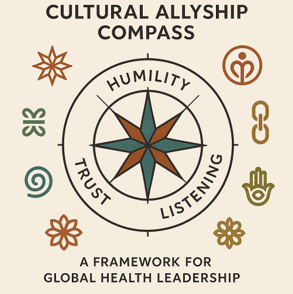Leading with a Renewed Lens: Inclusion, Allyship, and Faith in Practice
septembre 16, 2025
Curious Currents, Steady Course: Learning to Lead in a New Sector

When I embarked on the journey of becoming Executive Director at Mercy Ships Canada, which included pastoral responsibilities, I brought with me a leadership toolkit closely aligned with StrengthsFinder competencies in strategy, influencing, and execution. That toolkit had been refined over decades of experience in the maritime, logistics, and industrial real estate sectors.
Along the way, I came to realize that global health and charitable leadership demand something deeper: a commitment to relational trust, equity, and inclusive growth.
Leadership, I have come to understand, is about listening deeply, learning continuously, and making space for others’ distinct contributions. The journey begins with a crucial step: recognizing whose voices are centred, whose are missing, and how culture shapes both. This recognition is not just a formality; it is a fundamental aspect of inclusive leadership that values everyone’s unique perspective and contribution.
"Darryl’s approach to decision making is very collaborative and he is curious when we see situations differently. He takes the time to listen and explore my decision-making process and how my experiences and values have shaped my thought processes."
-Ms. Rosemary Smyth, Director of Programs, Business Operations & Risk.
That is why I invited four of the women I work alongside at Mercy Ships Canada to share their reflections in this story. Their insights not only deepen my understanding but also shape the way I lead.
My educational background and consulting experience have instilled in me a deep curiosity and a commitment to continuous learning. I did not enter the global health sector with fixed ideas about how things should be done. I arrived with a desire to understand and contribute, particularly during a time of considerable uncertainty marked by leadership transitions, a global pandemic, rising inflation, and the impacts of trade wars.
That same curiosity continues to guide me today as I ask more profound questions that shape my leadership journey:
- What does it take to cultivate a vibrant, performance-driven culture?
- How can I demonstrate my commitment as a meaningful ally in a sector led by women across diverse cultures?
- How can I fulfill my pastoral responsibilities in a pluralistic and multicultural context?
- What conditions enable individuals and teams to thrive, both personally and professionally, spiritually?
Practicing allyship across cultures is essential in global health leadership. According to the Oxford Review, allyship refers to the consistent and intentional efforts by men to support and advocate for inclusion and gender equity. For me, this has meant letting go of outdated habits, embracing uncertainty, and trusting in the team’s potential.
Reflecting and Growing Through a Multi-Cultural Lens

Building trust across cultures, generations, and diverse lived experiences is not about having all the answers; it is about fostering genuine connections.Inclusive leadership does not look the same everywhere, especially in a global context. Allyship, which includes the core principle of inclusion, transcends borders and cultures. At Mercy Ships Canada, we have welcomed and collaborated with colleagues from Canada, China, Colombia, Burundi, Brazil, France, India, Jordan, Mauritius, the Philippines, Russia, and beyond. This cultural diversity calls for presence,
listening, and humility as language, power dynamics, and social cues differ, and so does how trust is earned.
Building trust across cultures, generations, and diverse lived experiences is not about having all the answers; it is about fostering genuine connections. For me, that has meant replacing uncertainty with curiosity and embracing complexity.
Embracing nuance means recognizing that there may not be a single "right" answer and that diverse experiences enrich our understanding. It is about being intentional:
- Whose voices are in the room?
- Whose perspectives shape decisions?
- Whose ideas are shared—and credited?
Letting Go of the Lines: Unlearning to Lead with Others in Mind
Since relationship-building appeared only toward the lower end of my top ten StrengthsFinder results, pastoral and inclusive leadership has required intentional effort. It has meant challenging my instincts, broadening the range of voices I listen to, and making decisions that reflect a wider range of experiences. For me, it is never easy, but when I lead in this way, trust deepens, relationships strengthen, and our work becomes not only more effective but also more human. That transformation gives me hope, not just for the future of leadership and diversity, but for the possibility that each of us can contribute in some small way to the flourishing of the communities we live in and the people we serve.
One of the most valuable lessons I have learned is that leadership is about cultivating conditions for sustainable growth: our own and that of others. It means letting go of outdated mindsets, embracing discomfort, and having the courage to unlearn and relearn.
"As a new employee, stepping into a space where my voice is welcomed and my perspective valued has been both empowering and affirming. Making room for others to contribute is not just good leadership, it reflects trust, humility, and the belief that each person carries something vital to our collective impact."
-Ms. Aarti Hurry, Director Development, Impact & Engagement
Working in a faith-based charity required me to set aside some of the assumptions I had absorbed through my formal training in economics, often referred to as the “dismal science,” and adopt an abundance mindset. Insights from books such as Ships of Mercy, The Redemptive Nonprofit, Agents of Flourishing, Compassionate Leadership, Beyond Performance, Radical Candor and countless journal articles on global health and development began to take hold. This shift in thinking demanded both courage and humility. It required me to create space for others to contribute, shape outcomes, and shine.
"I joined Mercy Ships Canada after 12 years in non-profit leadership in Quebec, expecting a steep learning curve in an English-speaking, international context. But Darryl’s mentorship helped me see how my background could truly add value. He often invited my input, especially on content needing translation for Francophone audiences. That shifted my perspective: I once saw being French speaking as a limitation, but now I see it as a strength. It allows us to better connect with Canada’s diverse population. Translating and adapting content offers a fresh lens—often leading to valuable insights and even improvements to the English version. As a Francophone minority, I am attuned to the importance of every voice being heard. Darryl empowered me to use that awareness to advance our mission through volunteer engagement, partner support, donor stewardship, and team collaboration."
-Ms. Catherine Tremblay, Development and Volunteer Engagement Lead
Making space begins with modelling vulnerability. When leaders are willing to be vulnerable, they create an environment where others can bring more of themselves to the table. This kind of safety is not merely strategic; it is empowering. It fosters confidence, ownership, and shared leadership. And it is what keeps us focused on our collective voyage.
From Anchor to North Star: Leading with Faith and Allyship

As a leader in a faith-based international NGO, I base my approach on principles derived from both transformative and servant leadership models. Each approach encompasses spiritual values such as compassion, integrity, and empathy. These leadership philosophies have served as my north star, helping me integrate purpose with people-centred impact. Over time, I have also come to recognize the transformative power of allyship in leadership and decision-making. Inclusion must include the anchor practices of mentorship, but also move beyond
and into active advocacy. It is about leveraging one’s access, voice, and influence to champion lasting change, mitigate bias, adopt systems thinking, and create spaces where others are genuinely seen, heard, and empowered to contribute meaningfully and sustainably. Allyship is not a peripheral practice; rather, it is a dynamic tool for equity and belonging, making leadership not just effective but truly inclusive.
In executive leadership within a faith-based organization, I have the privilege of creating work routines and opportunities to intentionally share space, address inequities, and undertake the quieter yet crucial work of mentorship and advocacy. It involves removing barriers that may prevent people from participating fully. Advocacy, when grounded in faith, is about aligning our actions with our values and practicing love and justice in our leadership.
The Voyage Ahead

This article is not a story about how I got it right. It is a story about the voyage. I am still learning what inclusive executive and pastoral leadership looks like day-to-day, from whose contributions are acknowledged to knowing when it is time for me to step aside. Sometimes it means speaking up; sometimes, it means holding space. It is about ensuring every voice is not just heard but valued and honoured for its unique perspective and contribution. Leadership in this sense is not a destination but a daily practice that asks me to keep showing up with curiosity and humility.
Along this journey, I have been shaped by those who lead with courage and compassion. To the women and equity-seeking colleagues who have taught and challenged me, including those at Mercy Ships, Women Lift Health, and the Canadian Association for Global Health, I extend my gratitude. You have led not only with wisdom but also with expertise, excellence, presence, perseverance, and grace. As we navigate the evolving landscape of global health, we should lead with humility, listen with intention, and act with courage so that others may thrive.
"As a woman leading pharmacy teams on two hospital ships, I focus on fostering inclusion, trust, and empowerment. Strong leadership begins with listening and anticipating where support is needed most. When training someone for a senior role, I provide tools and mentorship, then step back to let them lead in their own way. I remain available for guidance, but I encourage each Senior Pharmacist to develop their own authority.
I also advocate for my department, ensuring staffing, workflows, technology, and training reflect real needs and support patient safety. This can be challenging when those without medical backgrounds make decisions, but I work to ensure our team’s voice is heard and respected.
As a woman in leadership, I’m committed to creating space for others to grow, contribute fully, and lead authentically."
-Ms. Sandy Hewitt, Pharmacy Clinical Coordinator

